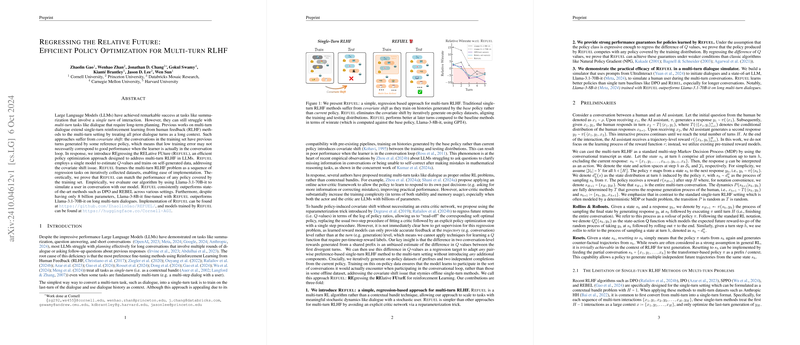Efficient Policy Optimization for Multi-turn Reinforcement Learning from Human Feedback in LLMs
The paper "Regressing the Relative Future: Efficient Policy Optimization for Multi-turn RLHF" addresses the inherent challenge of adapting reinforcement learning from human feedback (RLHF) to multi-turn interactions within LLMs. Traditional RLHF approaches, which predominantly focus on single-turn contexts, often falter in tasks demanding long-term planning and multi-turn dialogue management due to covariate shift issues. These issues arise when training on historical dialogue sequences generated by a reference policy, introducing a distribution mismatch during actual deployment.
To mitigate these challenges, the authors propose REgressing the RELative FUture (Refuel), a method designed to efficiently optimize policies for multi-turn RLHF within LLMs. Refuel employs a single model to estimate -values by training on self-generated data, ensuring robustness against covariate shifts. This is achieved by iteratively framing the problem as a series of regression tasks over on-policy datasets, simplifying the implementation process. Notably, the theoretical guarantees of Refuel demonstrate its ability to match the performance of any policy encapsulated within the training set distribution.
Empirical evaluations using the Llama-3.1-70B-it model demonstrate that Refuel consistently surpasses existing state-of-the-art methods, such as DPO and REBEL, across various benchmark settings. Remarkably, even with a smaller model size fine-tuned using Refuel, Llama-3-8B-it outperforms the larger model version on complex multi-turn dialogues, showcasing the practical benefits of the proposed approach.
The implications of this work are profound, both in practical and theoretical dimensions. Practically, Refuel provides a streamlined approach to enhance LLM interactions in real-world applications requiring multi-turn dialogue management. Theoretically, it establishes a novel method for addressing the covariate shift problem in multi-turn settings without the overhead of an explicit critic network commonly seen in actor-critic RL methods.
Future directions could involve exploring the integration of Refuel with real-world datasets, involving human-in-the-loop for more complex interactions, or adapting the methodology to other domains requiring sequential decision-making, providing a robust foundation for advancing AI capabilities in dynamic environments. The implementation and trained models are openly available, facilitating further research and development in this critical area of AI.
In summary, the Refuel approach offers a significant advancement in policy optimization for multi-turn RLHF, ensuring models can effectively plan and interact over extended dialogues, addressing a crucial limitation in current LLM applications.
